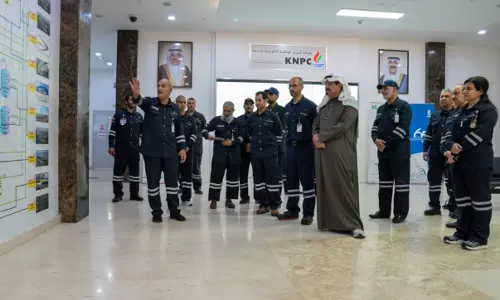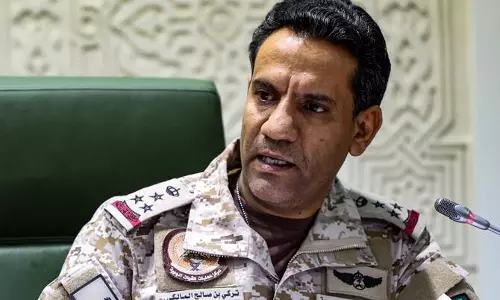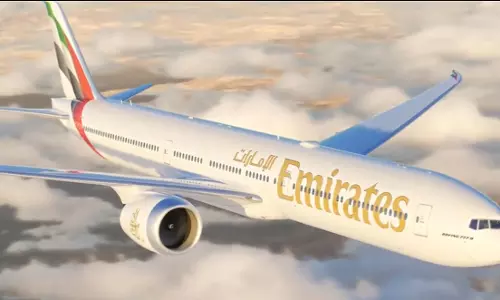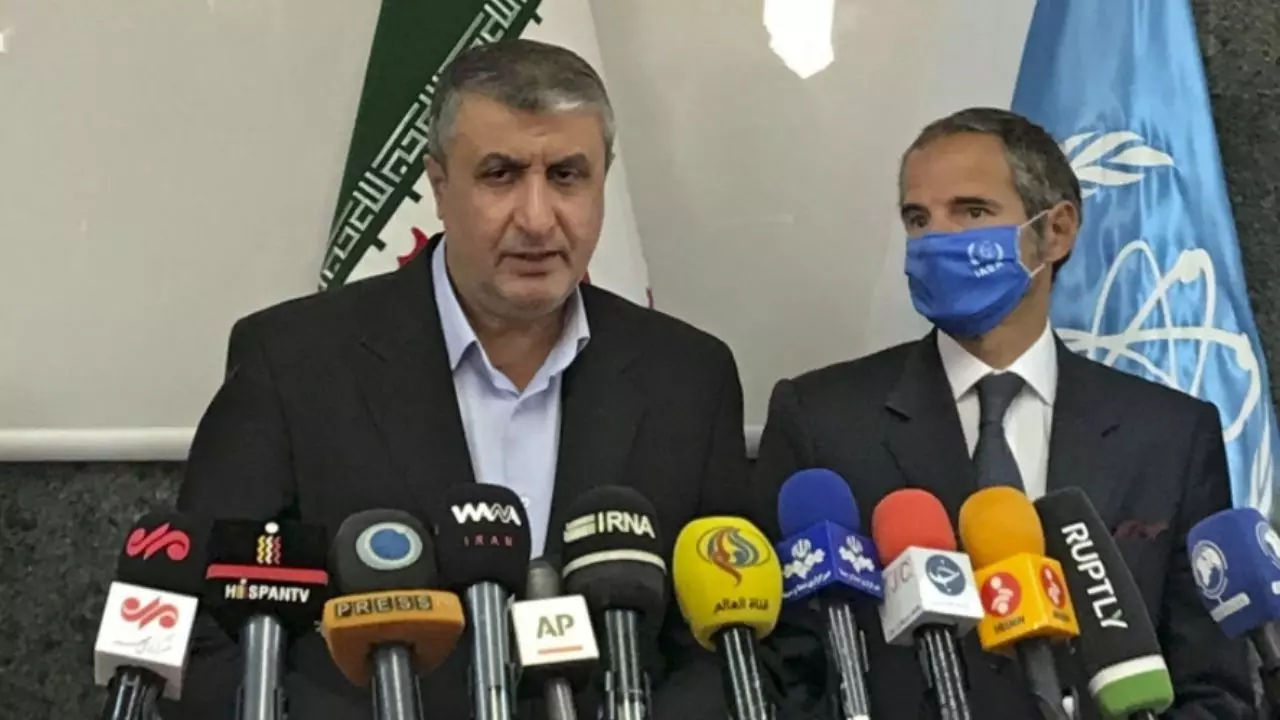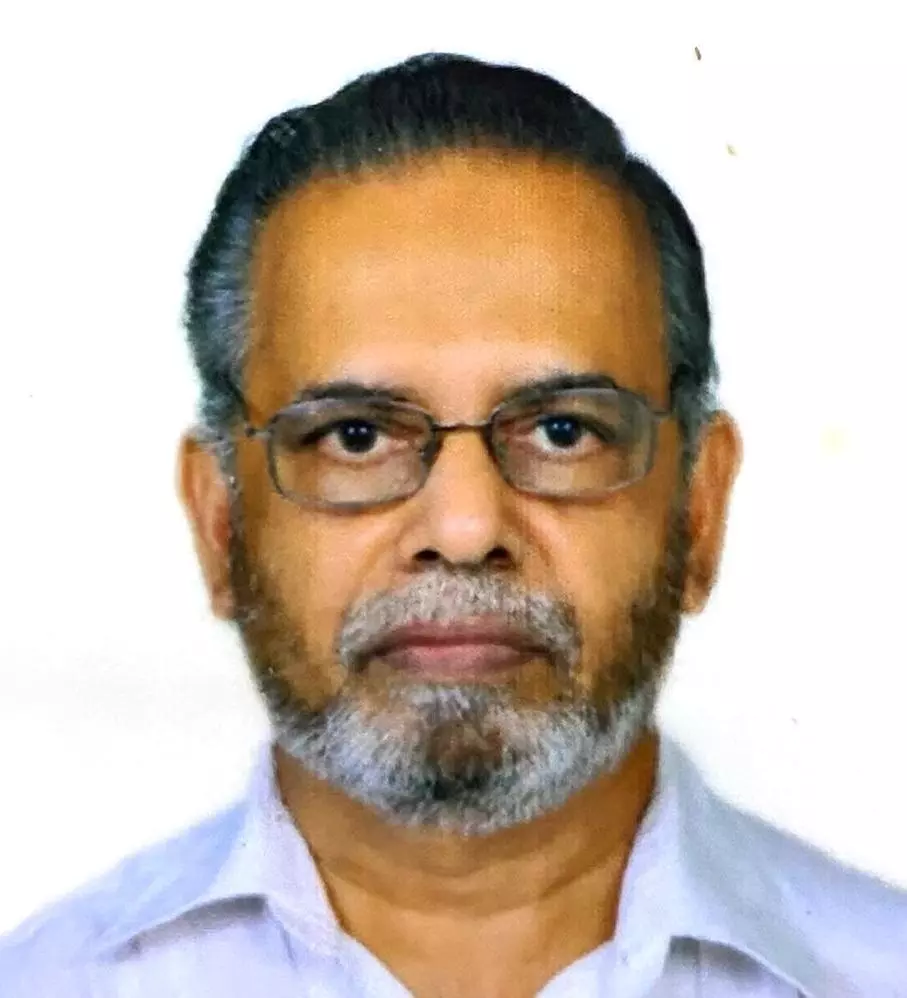
Nuclear negotiations and the Israeli tactics
text_fieldsIran's head of Atomic Energy Organisation and IAEA chief Rafael Grossi at a news conference in Tehran
According to the official media and diplomatic sources, the Iran nuclear negotiations were stopped on Friday, 3rd December to allow European countries to evaluate the proposals presented by Tehran and the US, while Israel called on the major powers to stop these talks and take tough steps against Iran. Iran submitted to European powers two drafts: one on lifting sanctions and the other on their nuclear commitments. An atmosphere of pessimism hangs over these negotiations due to the Iranian delegation's strict adherence to its conditions to limit the negotiations to the issue of the complete lifting of sanctions, and to receive American guarantees of full compliance with this lifting, and clear guarantees in this regard even if the regime changes in future.
This decision came after Iranian chief negotiator Ali Bagheri said that he had fruitful talks with the Director General of the International Atomic Energy Agency, Rafael Grossi, adding, "My discussions with Grossi are aimed at continuing cooperation with the IAEA." He added that the parties to the nuclear agreement should study his country's proposal and prepare for serious negotiations regarding those proposals. He pointed out that parties outside the nuclear agreement group were trying to influence the negotiations with the aim of thwarting them. He was referring to the interference of Israel to halt the negotiations. It was then that the participating delegations demanded to return to their governments to consult on some proposals put forward by the American and Iranian sides on reviving the 2015 agreement that the Trump administration withdrew from.
Iranian Foreign Minister Hossein Amir Abdollahian has previously said that a good deal was within reach if the West showed goodwill. He added on Twitter - that the Vienna talks were taking place in earnest, and lifting sanctions was a primary priority for Iran, and that the experts' talks were continuing, stressing that his country sought a rational and sober dialogue that would yield results. He added, "We went to Vienna with serious determination, but we are not optimistic about the intention of Washington and Europe. The important thing is that the negotiations reach a conclusion and that the Western parties show their seriousness." For his part, adviser to the Iranian delegation in the Vienna negotiations, Muhammad Marandi, told Al Jazeera that the obstacle to these talks was the American position, adding that the United States wanted to continue sanctions on his country. This was, according to an Iranian foreign ministry spokesman, due to Israel's "spreading lies" with the aim of spoiling the talks. A reporter for the American Axios news organization operating out of Tel Aviv stated that Israel had shared intelligence information with Washington and European allies indicating that Iran was taking technical measures to prepare for enriching uranium to a degree of 90 percent purity, which is the level needed to make a nuclear weapon. But, Iran denies this as their program is only for peaceful purposes.
The deal known as Joint Comprehensive Plan of Action (JCPOA) struck between Iran and six other countries- five permanent members in the Security Council plus Germany- did exercise restraint on Iran. This was strictly observed by Iran according to the officials of IAEA, as the agreement allowed the lifting of many economic sanctions imposed on it . But the United States unilaterally withdrew from the agreement in 2018 under its former president, Donald Trump, who reimposed severe economic sanctions on Tehran. A year later, Iran began to gradually retreat from its basic commitments under the agreement. Actually, Trump was persuaded to ditch the JCPOA deal by Jared Kushner due to the pressure from Netanyahu.
This greatly weakened the moderate camp in Iran and helped the hard-line conservative candidate Ebrahim Raisi win the election. Joe Biden, who succeeded Trump as president of the United States in early 2021, expressed his willingness to return his country to the agreement, on the condition that Iran returns to its commitments. The concerned parties, with the indirect participation of Washington, were now engaged in talks in Vienna to revive the agreement. This round of negotiations was the seventh of its kind and the first after the current Iranian President, the hard-line conservative Ebrahim Raisi, took office in August 2021. After informal consultations took place on Saturday and Sunday (29th and 30th of November) for the resumption of the negotiations. Russia's representative to international organizations in Vienna, Mikhail Ulyanov, revealed that Washington was ready to lift sanctions on Iran in return for the latter's commitment, adding, according to Al Arabiya News, that the "devil" lies in the details. On 2nd December Ulyanov said," We have a positive determination in the sense that every effort must be made to successfully complete the negotiations, because the alternative for this ranges from bad to very bad."
In the opinion of observers - the biggest winner so far is Iran, whether these negotiations succeeded or reached a dead end. With its oil exports to world markets, its maintenance of its ballistic missile programs and the production of drones, it continues to expand its regional role in the Middle East and the world. As for the failure of the negotiations, this means that it can continue to enrich uranium at high rates, including 90% of its nuclear production decision. The Supreme Council may cancel the 'fatwa' that forbids it in order to face the change of circumstances and deter any Israeli threats of attack.
In the past few days, the Israeli occupation has escalated its threats to launch a military strike on Iran, fearing that the Vienna talks would lead to an agreement to lift sanctions. It has prompted the US administration to warn it against undertaking any military operations. This has led to a crisis in US-Israeli relations, which was reflected in the phone call that US Secretary of State Anthony Blinken made to Israeli Prime Minister Naftali Bennett, while the negotiations were going on, in which he opposed Israeli demands to withdraw from the Vienna negotiations, and to drag the United States into any war with Iran. Benny Gantz, the Israeli Minister of Defence, will fly to Washington next week, accompanied by the head of the "Mossad" apparatus, in an attempt to settle this dispute, and to convince Washington of the Israeli attack plans. The Middle East is diverting its attention from the two main crises facing its country in Taiwan, in East Asia, and Ukraine with Russia in Central Europe.
Any Israeli aggression against Iran will be met with a catastrophic response. The Iranian leadership is not afraid of the United States, the superpower, and it shot down one of its most powerful drones in its fleet (Global Hawk) when it dared to penetrate its airspace over the Strait of Hormuz. Therefore, it will not pay attention to the Israeli threats, and Ismail Ismail , the head of the Quds Force in the Revolutionary Guards said that the United States will "bruise its teeth if it takes any step against Tehran, no matter how small." What Israel does not realize is that its attacks, no matter how great they are, will not stop the Iranian nuclear programs, because they are determined and the programs are buried under the majestic mountains (Fordow reactor, for example).
The issue is not a question of the success or failure of these negotiations in Vienna, but rather a question of who can withstand patiently and impose his conditions, Iran or the United States, and who concedes or hardens in his positions . Following the latest developments in the region, we can say that the United States has not succeeded in the past six rounds. And it was not believed that it would win in the seventh, in light of Iranian extremism, and its refusal to bow to pressure. It is Israel that has dragged the United States into this predicament, believing that it could drag it into war with Iran.
In the event of a collapse of the negotiations, whoever withdraws from his obligations under the nuclear agreement must pay the price, not the party that remained committed to it. The withdrawal in 2018 was the biggest unintended Israeli gift to Iran. Iran is in a position of strength, and its greatest weapon is its ability to withstand, make decisions, and rely on armed self-reliance and on allied military arms that rules the roost in Lebanon, Iraq, Yemen and the occupied Gaza Strip. As for America, its defeat in Afghanistan has taught its allies many lessons.
If Israel succeeds in its blackmail and Biden succumbs to their provocations it would lead to an unpredictable catastrophe.




